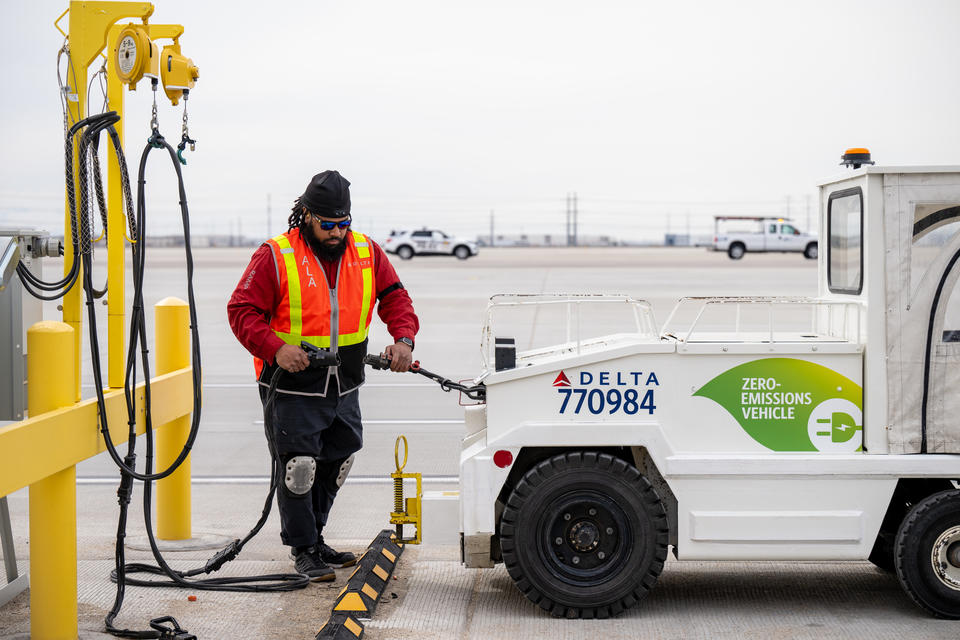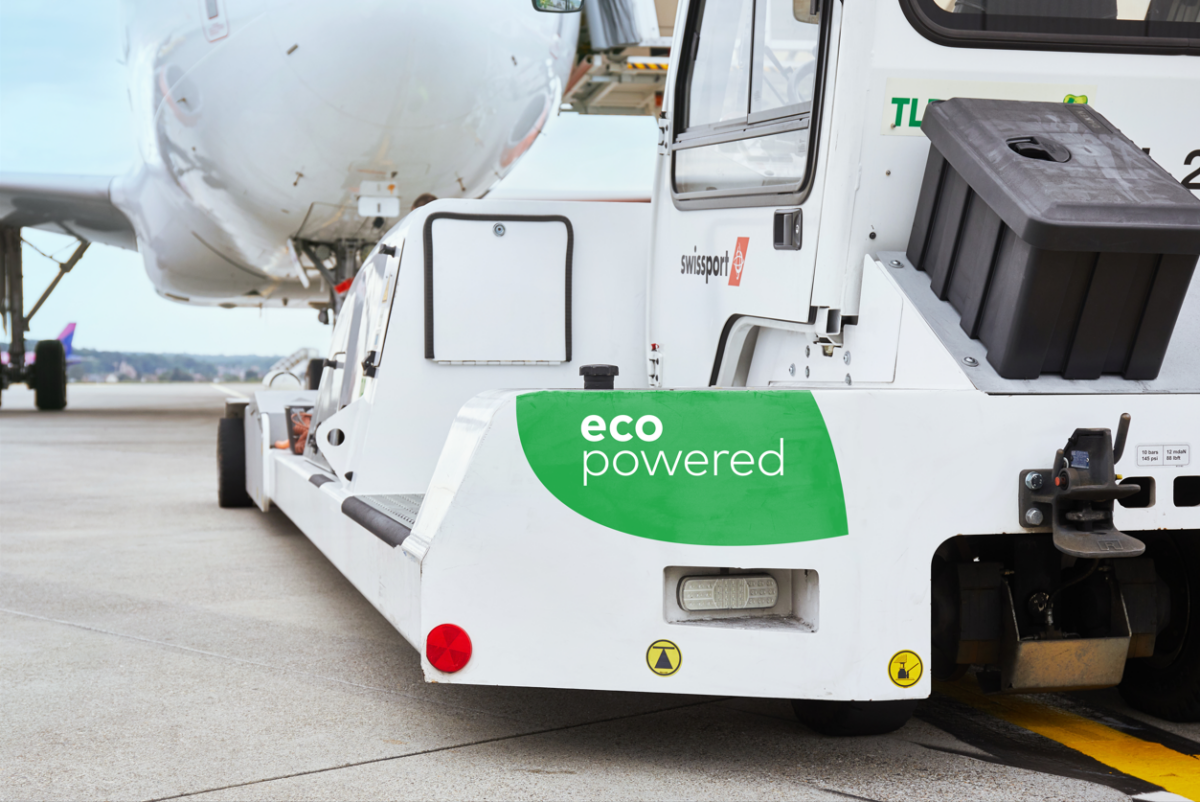Electrifying airport ground fleets: Challenges & solutions
Oct 08, 2024 · 6 min read · blog
Airports are significant contributors to carbon emissions, with many of their ground vehicles, like shuttle buses and baggage tractors, still running on diesel or gasoline. By replacing traditional vehicles with electric alternatives, airports can work toward sustainability targets, comply with regulations, and improve air quality.
This blog post explores the challenges and opportunities of electrifying airport ground fleets, highlight notable examples, and discuss how Volteum can support these electrification efforts.
The relevance and challenges of airport ground fleet electrification
Electrifying airport ground fleets offers a significant opportunity to cut emissions, as ground handling equipment and airside vehicles contribute substantially to an airport’s overall environmental impact.
The first step in electrifying airport ground fleets is to understand the complexity involved. Airports operate a variety of vehicles, including shuttle buses, towing tractors, belt loaders, and water trucks, and more. These vehicles have different energy needs and usage patterns, and they often share the same infrastructure within a confined space. This requires coordinated planning to ensure efficient operations. High upfront costs, infrastructure limitations, and logistical challenges are also common obstacles, as well as compatibility issues, maintenance needs, and safety considerations related to recharging stations.
A thorough assessment of current fleet operations is crucial for a smooth transition. Airports need to consider factors like vehicle ownership (whether airport-owned or contractor-operated), vehicle age, and differences between landside and airside operations. Additionally, evaluating the existing fuel infrastructure, maintenance practices, and emissions footprint helps identify logistical challenges and set realistic electrification targets.

Government policies and incentives are accelerating the shift toward zero-emission fleets. The FAA's ZEV and VALE programs in the United States provide crucial support for airport electrification efforts. These programs offer grants for purchasing zero-emission vehicles, such as electric and hydrogen-powered ground support equipment, as well as for building the necessary charging infrastructure. In Europe, the Alternative Fuels Infrastructure Facility (AFIF) under the EU's Connecting Europe Facility provides substantial funding for sustainable transport infrastructure. In 2024, over €1.3 billion has been allocated to projects, including electrifying ground operations at 21 airports and deploying thousands of recharging points along the TEN-T network. The funding is part of the EU's broader goal to achieve net-zero emissions, aligning with the ambitions of the EU Green Deal. These programs play a key role in accelerating airport ground fleet electrification by offering financial support to overcome initial investment barriers.

Image: Delta News Hub
Notable examples of airport electrification initiatives
As airports navigate the complexities of electrification, many are already taking meaningful steps to convert their ground fleets to electric vehicles. While these examples showcase some notable efforts, many more initiatives are underway worldwide.
United States:
- Denver International Airport is advancing its electrification efforts with a $300,000 federal grant to develop an Electrification Master Plan, which includes adding electric charging stations and replacing diesel ground support equipment with electric alternatives as part of its Vision 100 sustainability goals.
- Indianapolis International Airport received funding under the FAA ZEV program for electric shuttle buses.
- John Wayne Airport (Orange County, California) received $1 million from the FAA to fund a 35-foot electric shuttle bus and charging infrastructure.
- Salt Lake City International Airport and Boston Logan International Airport are both nearing 100% electrification of their core ground support equipment fleets, driven by Delta Air Lines' substantial investment to achieve net-zero operations by 2050.
- Charlotte Douglas International Airport in North Carolina was awarded $3.9 million to acquire a fleet of five 35-foot electric shuttle buses. The funding aims to support the airport's long-term sustainability goals, alongside ongoing efforts to electrify other ground equipment.

Image: Swissport
European Union:
- Cologne Bonn Airport in Germany is investing in electric ground power units, gradually transitioning to an all-electric fleet by 2035.
- Brussels Airport, collaborating with DHL Express, has electrified a third of its ground-handling fleet, aiming to cut CO2 emissions by over 50% through the Stargate project.
- Zurich and Schiphol Airports have partnered with Swissport to electrify ground services, with Zurich targeting 55% electric ground handling equipment by the end of 2024.
- Vienna Airport is moving towards a fully electric ground fleet, having already achieved CO2 neutrality and implemented extensive recharging infrastructure.
- Frankfurt Airport is expanding its use of electric vehicles with state support to decarbonize operations, including new recharging hubs and electric buses.
- Aeroporti di Roma is leading the Italian Pact for Decarbonisation of Air Transport, focusing on electric ground handling equipment and infrastructure improvements.
- Milan Linate and Malpensa Airports are advancing their electrification through the eMAGO project, which focuses on converting ground vehicles to electric and improving energy efficiency as part of the airports' net-zero goals.
The growing trend toward airport electrification shows that the industry is using innovative solutions to reduce emissions and meet climate goals. Airports worldwide are adopting various strategies, from large-scale investments in electric ground support equipment to leveraging government incentives that support infrastructure upgrades. These efforts demonstrate the aviation sector’s commitment to a more sustainable future and lay the groundwork for the broader adoption of zero-emission technologies.

How Volteum can assist with electrification projects
Volteum provides powerful tools to help airports navigate the complexities of transitioning to electric ground fleets. With a data-driven approach, Volteum supports every stage of the electrification process, from planning to ongoing operations, ensuring airports can achieve their sustainability targets efficiently.
- Electric Fleet Planner: The software enables airports to analyze current fleet operations and develop tailored electrification strategies. The platform assesses key factors such as vehicle usage, energy requirements, and operational patterns to recommend suitable electric vehicle alternatives. It also helps plan optimal charging infrastructure, offering insights into Total Cost of Ownership (TCO) to ensure cost-effective decision-making.
- Electric Fleet Operations: Once electric vehicles are in place, Volteum continues to support airports manage daily operations by ensuring the fleet remains fully charged and ready for use, minimizing downtime and operational disruptions.
Volteum's data-driven approach simplifies the transition to electric fleets, reducing costs associated with planning and operations and accelerating the move to zero-emission fleets while maintaining high levels of efficiency and service quality.
To learn more about how Volteum can assist with your electrification projects or to discuss your specific needs, contact us via the link below for expert support and guidance!